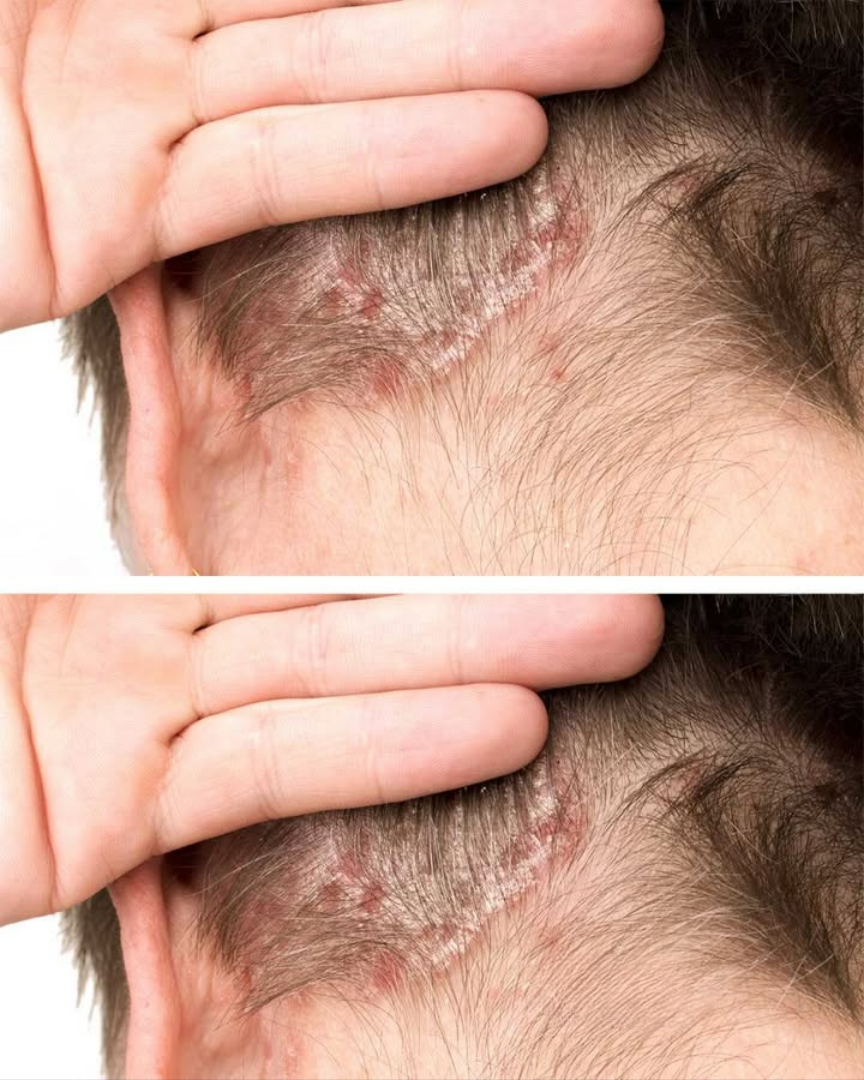
Found this on my son’s scalp. Have no idea what it is and we can’t get a doc appt soon. Tips?
Psoriasis vulgaris, the most common form of psoriasis, is a chronic autoimmune disorder that affects the skin, including the scalp. It occurs when the immune system mistakenly attacks healthy skin cells, leading to rapid cell turnover and the formation of thick, scaly patches. These patches can be itchy, painful, and may crack and bleed.
Psoriasis is a multifactorial condition, influenced by genetic predisposition and environmental triggers such as stress, infections, and certain medications. While there is no cure, various treatments can help manage symptoms and improve quality of life. Understanding the nature of psoriasis vulgaris is essential for effective management and treatment.
4. Identifying Psoriasis on the Scalp
Scalp psoriasis is characterized by raised, reddish patches covered with silvery-white scales. These patches can extend beyond the hairline and may be accompanied by itching, burning, or soreness. In some cases, scalp psoriasis can cause temporary hair loss due to scratching or the presence of thick scales.
To identify psoriasis on the scalp, look for well-defined plaques that are distinct from the surrounding skin. These plaques can vary in size and may appear in isolated patches or cover large areas of the scalp. It’s important to differentiate scalp psoriasis from other conditions like seborrheic dermatitis, which tends to have a more diffuse, greasy appearance.
5. Home Remedies for Scalp Psoriasis
Several home remedies can help alleviate the symptoms of scalp psoriasis. One effective approach is the use of moisturizing agents, such as coconut oil or aloe vera gel, to soothe dryness and reduce scaling. Applying these agents to the scalp and leaving them on for several hours or overnight can help soften scales and ease discomfort.
Another remedy is the use of apple cider vinegar, which has natural antiseptic properties. Diluting it with water and applying it to the scalp can help reduce itching and inflammation. Additionally, regular exposure to sunlight, while protecting the skin from UV damage, can help slow down the rapid skin cell turnover associated with psoriasis.
6. Over-the-Counter Treatments to Consider
Over-the-counter (OTC) treatments can be beneficial for managing mild to moderate scalp psoriasis. Shampoos containing coal tar or salicylic acid are commonly used to reduce scaling and inflammation. Coal tar helps slow skin cell growth, while salicylic acid aids in the removal of scales.
Topical corticosteroids, available in various strengths, can also be effective in reducing inflammation and itching. It’s important to follow the instructions on these products carefully and consult with a pharmacist if you have any questions. Consistent use of these treatments can help manage symptoms and prevent flare-ups.
7. When to Seek Medical Attention
While home remedies and OTC treatments can provide relief, it’s important to seek medical attention if your child’s scalp condition worsens or does not improve with self-care measures. Persistent symptoms, such as severe itching, pain, or extensive scaling, warrant a professional evaluation.
Additionally, if your child experiences signs of infection, such as increased redness, swelling, or pus, it’s crucial to consult a healthcare provider promptly. A dermatologist can provide a definitive diagnosis and recommend prescription treatments tailored to your child’s specific needs.
8. Tips for Managing Scalp Psoriasis at Home
Managing scalp psoriasis at home involves a combination of lifestyle adjustments and consistent treatment. Regularly moisturizing the scalp can help prevent dryness and reduce scaling. Using a humidifier in your home can also maintain moisture levels in the air, which can benefit the skin.
It’s important to avoid triggers that can exacerbate psoriasis, such as stress, smoking, and certain foods. Keeping a diary to track flare-ups and identify potential triggers can be helpful. Additionally, gentle hair care practices, such as using a soft-bristle brush and avoiding harsh hair treatments, can prevent irritation and minimize hair loss.
9. Viral Hacks for Scalp Care
In recent years, several viral hacks for scalp care have gained popularity, offering alternative approaches to managing scalp conditions. One such hack is the use of tea tree oil, known for its antifungal and anti-inflammatory properties. Adding a few drops to your regular shampoo can help soothe the scalp and reduce dandruff.
Another popular hack is the use of baking soda as a gentle exfoliant. Mixing it with water to form a paste and applying it to the scalp can help remove dead skin cells and reduce scaling. However, it’s important to use these hacks with caution and conduct a patch test to ensure there is no adverse reaction.
10. How to Document Symptoms for Your Doctor
